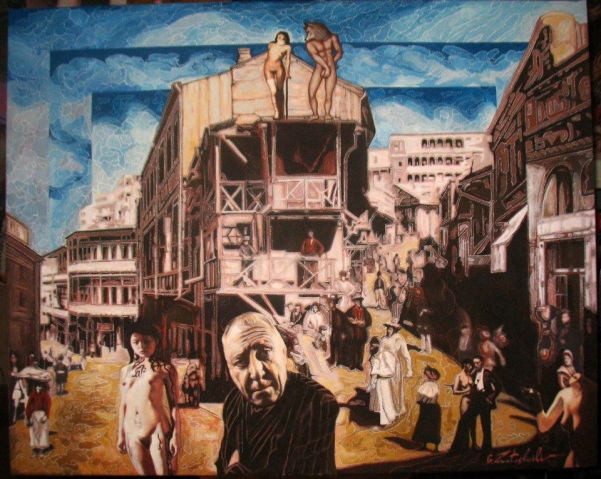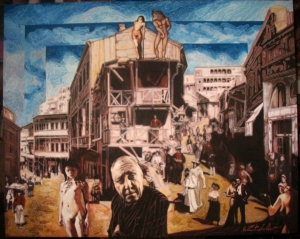Gela Zautashvili: An Artist on the Edge of Civilizations
If we follow the history of modern Georgian art, Gela Zautashvili says he would put himself among those artists who entered the scene during the 1980s.
“I was among those who set up, in 1987, the first serious exhibition of abstractionism since Parisian players Kakabadze and Gudiashvili. Together with me was Gia Edzgveradze, Iliko Zautashvili, and Luka Lasareishvili.”
The exhibition was an important one, especially considering it took place during the communist regime, when such exhibitions were nearly impossible and when even half-abstract paintings were not allowed.
“It was taboo and we defeated this taboo,” Zautashvili says. “The same year the same exhibition was arranged in Tbilisi but without the paintings of Ilia Mgaloblishvili.”
As well as receiving international acclaim and more than one mention in the press, the exhibition led to the 1988 Moscow Sotheby auction: “Russian and Soviet Avant-Garde” in which Georgian painter Edzgveradze participated. “After which he made a successful career,” Zautashvili tells us. “Yet there was something special about this auction: the Sotheby and Christy auctions have a system with experts who come to the country they are interested in and check and meet the unknown candidates and artists, taking into account local famous art figures. That time, they had to choose from representatives of Russia, Georgia, Ukraine and Estonia. The Ministry of Culture of the Soviet Union offered Russian painter Glazunov whose paintings were not on the chosen list of Sotheby but who, in any case, they were forced to represent at the auction.”
Zautashvili has a low estimation of the current art market and states that “politics rules everything.”
“The Ministry of Culture is not working, there exists no politics of culture,” he says. “Where before an exhibition of Georgian artists was arranged in the Cobra gallery in Amsterdam, today nothing like this happens.”
We asked Zautashvili whether he considered himself a truly Georgian artist.
“Any artist who claims to be cosmopolitan is a carrier of Georgian talent, intellect and nobility. I was so from childhood; always reading, always interested in the more intellectual side of issues than the emotional. When I touched the eastern world: India, China, Islam, Sufism, I was so interested that I tried to play games with Western and Eastern elements. I always say that so-called New Art is a game. I don’t know who begun this game: maybe it started with Picasso and Marcel Duchamp. We live in a show; everything is a show, and unfortunately this is fact: the picture on an exhibited canvas nowadays doesn’t provoke so much interest and emotion as a video art installation does, which destroy the two-dimensional space. The most famous biennales are interested in conceptual art and performances rather than easel painting: there are few traditional easel paintings at the biennales,” he laments. “But the new generations is very interesting; it creates many interesting things, new conceptions of art, with installation elements. Yet, I still love painting pictures.”
We asked Zautashvili if he thought the geopolitical location of Georgia influenced Georgian art and its condition.
“This is exactly the main problem. At the Venice Biennale, Georgian artists were represented last after Azerbaijan and Armenian artists, when it seems that Tbilisi is considered the center of Transcaucasia. It happens because Georgians are not interested in art. There are around just 10 Georgian painters with global importance who can be exhibited in world galleries. But then that can seem logical after all the cataclysms we went through in the last 20 years, cataclysms mostly provoked by our complicated geopolitical situation.”
As to what lies in store in the art world, Zautashvili cannot predict: “Marcel Duchamp was great because he painted a mustache on Gioconda. Andy Warhol created Marilyn Monroe. We now face an abnormal triumph of materialism. No one can say what art will be tomorrow. Humans almost found God. It is impossible to go back to the old ways.”
Ketevan Charkhalashvili











